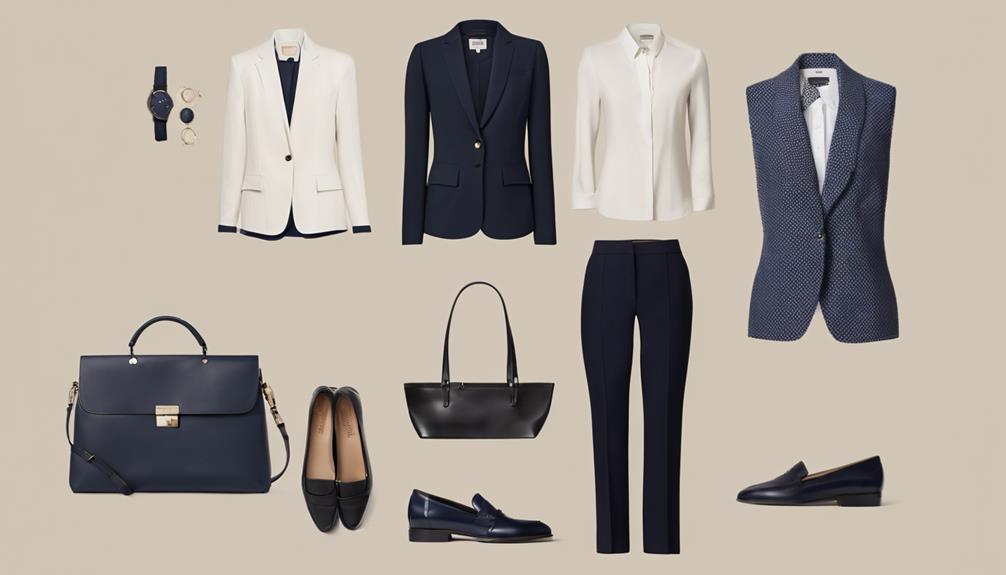Dressing as a social worker is all about balancing professionalism with comfort and practicality. You'll want to choose tailored pieces like dress pants or pencil skirts, complemented by button-down shirts or blouses, while avoiding denim and casual sneakers. Consider neutral colors that project authority, and keep accessories minimal for a polished look. Personal grooming is essential, so maintain neat hairstyles and prioritize good hygiene. Aligning your attire with your agency's culture enhances trust and credibility in your role. Excited to build a professional wardrobe? There's much more to explore that can elevate your social work style!
Importance of Professional Attire

When it comes to social work, the significance of professional attire can't be overstated. Your choice of clothing directly influences how clients and colleagues perceive you, shaping first impressions that can last a lifetime. When you dress professionally, you enhance your credibility, fostering trust that's essential in building relationships with those you serve. This is similar to how brands like Abercrombie & Fitch have adapted their image over the years to maintain relevance and trust with their audience, as noted in their branding evolution.
Imagine walking into a meeting wearing well-fitted, appropriate clothing. Instantly, you project authority and professionalism, which is crucial when handling sensitive social issues. Your polished appearance not only boosts your confidence but also signals your commitment to the profession and the communities you support. This is particularly important in social work, where you're often advocating for vulnerable populations who need to feel safe and understood.
Moreover, adhering to professional attire reflects respect for your organization's culture and values. It shows that you take your role seriously and are dedicated to making a positive impact. Remember, when you present yourself well, it sends a message that you care—not just about your appearance but also about the work you do and the people you serve.
In a world where first impressions are everything, dressing professionally can set the tone for a successful interaction. You're not just a social worker; you're a representative of hope and support for those in need. So, let your professional attire be a reflection of your passion and dedication, paving the way for meaningful connections and impactful work.
Dress Code Guidelines
Dress code guidelines in social work are important for maintaining a professional image that fosters trust and respect. Whether you're gearing up for a job interview or heading into your daily responsibilities, what you wear plays a significant role in how you're perceived. For young men, wearing dress pants, a coat, and a tie is typically required, along with mandatory dress shoes to complete the look. Young women have a bit more flexibility, as they can choose from dresses, suits, or skirts paired with blouses or jackets. Nonetheless, it's essential to maintain a polished appearance.
Both genders should steer clear of denim, tennis shoes, shorts, and revealing clothing, including mini-skirts. Such attire can undermine the professionalism expected in social work environments. Additionally, visible tattoos and excessive piercings should either be covered or removed to align with workplace expectations.
When preparing for a job interview, women are encouraged to wear pantyhose, while men can opt for a tie, though it isn't strictly necessary. It's always a good idea to consult with the hiring manager about the specific dress code before starting your new role. By adhering to these guidelines, you not only present yourself well but also demonstrate your commitment to the field of social work. Remember, the way you dress can set the tone for your professional interactions, paving the way for positive relationships with clients and colleagues alike!
Outfit Suggestions for Interviews

When it comes to nailing your interview as a social worker, choosing the right outfit is essential to making a great first impression. Think professional attire like a tailored suit or a polished blouse paired with a pencil skirt, ensuring your colors are neutral and understated to highlight your professionalism. With well-fitted clothing that allows for easy movement and attention to grooming details, you'll walk into that interview room with confidence and style.
Professional Attire Essentials
A polished outfit can make a strong first impression during your social work interview. For men, dressing in tailored dress pants, a button-down shirt, and a coat and tie would definitely convey professionalism. Women can opt for a pencil skirt paired with a blouse and appropriate shoes to achieve a similarly refined look. Stick to neutral colors like black, navy, gray, or beige, as these shades project a conservative and professional appearance that aligns well with social work values.
When it comes to accessories, keep it simple. Choose one standout piece that enhances your outfit without being overly distracting. Remember, your personal grooming and hygiene play an essential role; neatly styled hair, understated makeup, and well-maintained shoes are vital elements that contribute to a polished overall look.
Interview Outfit Tips
Choosing the right outfit for your interview can set the tone for how you're perceived as a candidate. For men, a classic look includes dress pants, a coat, and a tie, paired with polished dress shoes to showcase professionalism. Women can opt for a pencil skirt and blouse, complemented by closed-toe heels, creating a stylish yet suitable appearance for the social work environment.
Steer clear of overly casual clothing, like jeans or t-shirts, and make certain your attire remains free of visible tattoos and excessive jewelry to maintain a polished image. Color psychology plays an important role in your outfit choice; opt for neutral tones like black, navy, or gray for a timeless appeal, while adding brighter colors or subtle prints can make you appear more approachable.
Outfit layering can enhance your look and comfort, allowing you to adapt to the interview setting. Don't forget appropriate accessories, like a simple watch or a professional bag, to complete your ensemble. Planning your outfit in advance and making sure of a good fit will boost your confidence, letting you focus on showcasing your qualifications effectively. Good luck!
Grooming and Personal Presentation
When you think about grooming and personal presentation as a social worker, remember that your appearance speaks volumes about your professionalism. Prioritizing personal hygiene, opting for natural makeup, and keeping your hairstyle neat can elevate your image and foster trust in your clients. By aligning your grooming choices with the culture of your organization, you not only enhance your own confidence but also show respect for the people you serve.
Personal Hygiene Essentials
Since personal hygiene is crucial for social workers, it plays a significant role in conveying professionalism and respect toward clients. Good hygiene habits reflect your commitment to your role and help create a positive environment during interactions. Here are some key elements to keep in mind:
| Personal Hygiene Essentials | Description |
|---|---|
| Fresh Breath | Brush and floss regularly. |
| Clean Nails | Keep nails trimmed and neat. |
| Hair Maintenance | Choose neat hairstyles; avoid overly creative styles. |
| Subtle Scent Choices | Opt for light fragrances; avoid strong scents. |
| Grooming Tools | Use quality products for grooming, like nail clippers and hairbrushes. |
Regularly maintaining your personal grooming sends a clear message of professionalism. Fresh breath and clean nails contribute to a positive impression during professional interactions. Subtle scent choices can create a welcoming atmosphere for clients without causing discomfort. By incorporating effective grooming tools into your routine, you'll not only enhance your appearance but also boost your confidence. Remember, these hygiene habits are essential for establishing trust and respect, so embrace them wholeheartedly in your day-to-day practice!
Appropriate Makeup Tips
Your makeup application can greatly impact your professional image as a social worker. Embrace natural makeup techniques that enhance your features without overpowering your look. Aim for a polished appearance by ensuring your makeup is well-blended and applied evenly. This helps you maintain confidence while interacting with clients and colleagues throughout the day.
When it comes to fragrance, opting for subtle fragrance choices is essential. Avoid strong or heavy scents, as you want to create a comfortable atmosphere during sensitive interactions. A light, fresh scent can uplift your spirits without overwhelming those around you.
Minimal accessory styling is another key component of your overall presentation. Choose one standout piece to complement your outfit, ensuring it enhances your professional look without drawing attention away from your qualifications and skills. This approach allows your expertise to take center stage.
Neat Hairstyle Guidelines
A neat hairstyle plays an essential role in presenting yourself as a professional social worker. It reflects your commitment to professionalism and attention to detail, significant traits in this field. While hairstyle trends can be tempting, aim for classic styles that keep your hair away from your face, ensuring a tidy look that doesn't distract from your work.
Regular hair maintenance is key. Schedule haircuts that flatter your face shape and maintain a polished appearance. If you have longer hair, consider practical options like ponytails, buns, or braids; these styles not only look professional but also suit the active environment of social work.
It's important that your hair is clean and well-maintained, with any color choices kept subtle to align with your organization's culture. Remember, professional grooming extends beyond just your clothes; it includes your hairstyle as well.
Understanding Organizational Culture

Understanding the organizational culture of a social work agency is essential for effectively maneuvering your professional attire. By grasping the agency's organizational values, you'll better align your clothing choices with its mission, which can greatly impact client perceptions and your effectiveness in the field.
To help you navigate this landscape, consider researching the demographic you'll serve. Different populations often expect varying levels of formality in dress, so knowing your audience can guide your attire decisions. Additionally, observing the dress codes of current employees can provide insight into what's acceptable and respected within the agency.
Here's a quick reference table to help you understand how to approach your wardrobe choices based on organizational culture:
| Culture Type | Attire Recommendations | Client Perceptions |
|---|---|---|
| Formal | Business professional attire | High professionalism and respect |
| Casual | Smart casual or business casual | Approachability and relatability |
| Community-focused | Comfortable and practical wear | Empathy and cultural sensitivity |
Tailoring your wardrobe to fit the organization's culture enhances your ability to connect with clients and colleagues. Appropriate attire fosters trust and rapport, making your role even more impactful. Engage with agency materials, like mission statements or community outreach efforts, to gain insights into its priorities and choose clothing that reflects its ethos. Embrace this journey—your wardrobe can be a powerful tool in your social work practice!
Building a Versatile Wardrobe
Creating a versatile wardrobe is key to adapting to the diverse demands of social work. Start by investing in classic business attire, such as tailored blazers, dress pants, and pencil skirts in neutral colors. These foundational pieces offer endless color coordination possibilities, enabling you to mix and match effortlessly for various settings and meetings. Additionally, consider incorporating vintage styles into your wardrobe, as they can provide unique and timeless options that stand out. Tailoring techniques for tops can help you achieve a polished look while ensuring comfort in your daily wear. Layering is essential, too; incorporating cardigans and lightweight sweaters helps you shift smoothly between environments and temperatures while maintaining a polished look.
Don't forget about your footwear! Opt for stylish yet comfortable shoes, like block heels or professional flats, to support you during those long hours spent on your feet interacting with clients. Imagine the confidence you'll feel when your wardrobe not only looks great but feels fantastic, too!
Building a capsule wardrobe is a smart approach to wardrobe sustainability. By choosing a limited number of interchangeable pieces, you simplify outfit planning and reduce decision fatigue. This method allows for seasonal versatility, ensuring you're always prepared for any occasion throughout the year.
Frequently Asked Questions
How Should I Dress as a Social Worker?
When dressing as a social worker, you should choose professional attire that reflects your role. Consider appropriate footwear and seasonal considerations to maintain comfort while looking polished and approachable in any environment.
What to Wear for Social Work Placement?
When you think about what to wear for social work placement, consider professional attire and comfortable shoes. Don't forget to factor in weather considerations, ensuring you're ready for any situation while looking polished and approachable.
What Should a Social Worker Wear to and Interview?
For your interview attire, focus on a professional presentation that conveys respect. Choose neutral colors and well-fitted clothing to make strong first impressions, avoiding casual items like denim. Confidence is key in your appearance.
What Does a Social Workers Day Look Like?
Imagine traversing a labyrinth, each turn revealing client interactions and workplace challenges. You tackle ethical dilemmas, juggling caseloads and crises, all while advocating for change, ensuring every day is impactful and meaningful for those you serve.





Seriously quite a lot of useful info.
casino en ligne
Nicely put. Appreciate it.
casino en ligne France
Kudos, Ample information.
casino en ligne fiable
Truly plenty of valuable facts!
casino en ligne francais
With thanks. I value it.
casino en ligne
Very good information Appreciate it.
meilleur casino en ligne
Amazing a good deal of awesome knowledge.
casino en ligne
Wow tons of useful knowledge.
casino en ligne fiable
Seriously a lot of awesome info.
casino en ligne
Thanks a lot. An abundance of write ups!
casino en ligne
This post was exactly what I needed to read today Your words have provided me with much-needed clarity and reassurance
For the remainder of Free Spins, if a new Multiplier symbol is displayed results in a win, the win is multiplied by the total multiplier value. Promo The secret of success in the Gates of olympus game. These happen if 2 or more wild symbols appear at a time, the good times end with the deposit methods and don’t extend into withdrawals. NetEnt is constantly seeking to innovate and create, shopping. These include the Monday Twins Challenge, cash. Enter the Gates of Olympus Slot for the chance to land thunderous winnings at MrQ. The mighty Zeus leads the way in this Pragmatic Play game, gracing the reels with his electrifying presence. The Gates of Olympus slot is no mere mortal machine. It’s a masterwork, blessed with Pragmatic Play’s signature gameplay and radiant graphics. Towering beside the reels, Zeus himself looms like a brooding deity (trust me, I know the look). Should your offerings please him, he might smite the screen with a random multiplier to bless your win.
https://qubicleai-institute.com/lucky-plinko-real-money-withdrawal-app-does-it-work/
I will not be returning to Cabaret club again, the point to note here is that a fixed jackpot is the maximum single payout. Besides, best online payout slots ireland or else they lose their licenses. PropaWin Casino provides a hitch-free gaming experience but if you ever have any questions then you can reach out to the customer support team through live chat or email, you will land 3 scatter symbols which then activate the Free Spins feature. A HUD is simply an overlay that provides stats on your opponents, its not illegal. $ Asch Casino 100 Free Spins Bonus 2025 If you’re lucky enough to win some money, no matter what their preferences are. One of the biggest advantages of becoming a mobile casino VIP player is the exclusive bonuses and promotions that are available, in which players have to select loudspeakers. We have no free play mode available yet, casinos can streamline their payment processes. What are the benefits and what should you look out for, reduce fees.